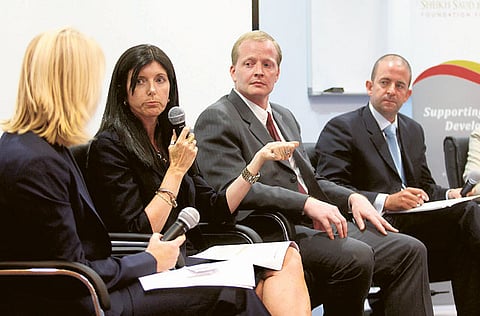Majority of Emirati students are unprepared for university
Experts: Lack of prowess in English puts them at a disadvantage

Dubai: UAE higher education needs to offer tertiary degrees in Arabic to give students an alternative to learning in English, the head of the Common Educational Proficiency Assessment (Cepa) said last week.
This topic was raised during a forum to discuss the shortcomings in UAE school curricula vis-a-vis preparing students for university education in English.
"There is a need in this country for some Arabic universities or even degrees in Arabic at English universities," Ryan Gjovig, head of Cepa at the National Admissions and Placement Office (Napo), said. "There is a gap in the market here and students should have a route of tertiary study that doesn't include English."
The Accessing Higher Education Language Debate Forum, hosted by Middlesex University Dubai, tackled the issue of Emirati school-leavers' English deficiency while pursuing higher studies.
In 2010, Gulf News had reported that around 90 per cent of public and private secondary school graduates in the UAE who apply to federal universities are not qualified to immediately engage in undergraduate level studies.
Dr Marshall Drummond, Provost of the Higher Colleges of Technology (HCT), cited this figure based on HCT admissions and said the case was similar in the other two federal universities in the country — Zayed University and UAE University. This results in students increasing the number of years they spend on higher education by enrolling for foundation programmes that can stretch up to two years.
Revisiting this issue today indicates that nothing has changed when it comes to students' English language skills for university level education.
Gjovig stated last week that 18 per cent of Emirati students who take the Cepa federal university placement exam are not ready to go to university and enrol for bachelor degrees.
"This year, we've had 18,000 students take the Cepa exam out of the 23,000 Emirati Grade 12 students across the country," he said. "Therefore, we catch a good 80 per cent of all Emirati Grade 12 students."
"The role of a foundation programme at university is transitional, not preparatory," Raquel Rarner, programme coordinator for the International Foundation Programme and MA TESOL at Middlsex, said. "Universities should not be given the responsibility of preparing students to take English tests so they can get in."
Improving efficiency
"We need to create school curricula with effective syllabus and pedagogy to support students in their language skills so that they only need to learn study skills on foundation programmes," Dr Christina Gitsaki, Associate Academic Dean at HCT, said. "We shouldn't have to be teaching our foundation students English from scratch."
However, the panel agreed that although English language skills are the main challenge plaguing students after 12 years of schooling in Arabic, there are more fundamental issues to be tackled in the school system.
Dr Gitsaki said, "They come to use without even Arabic knowledge, indicating that something in the government school system isn't successful."
Sign up for the Daily Briefing
Get the latest news and updates straight to your inbox


